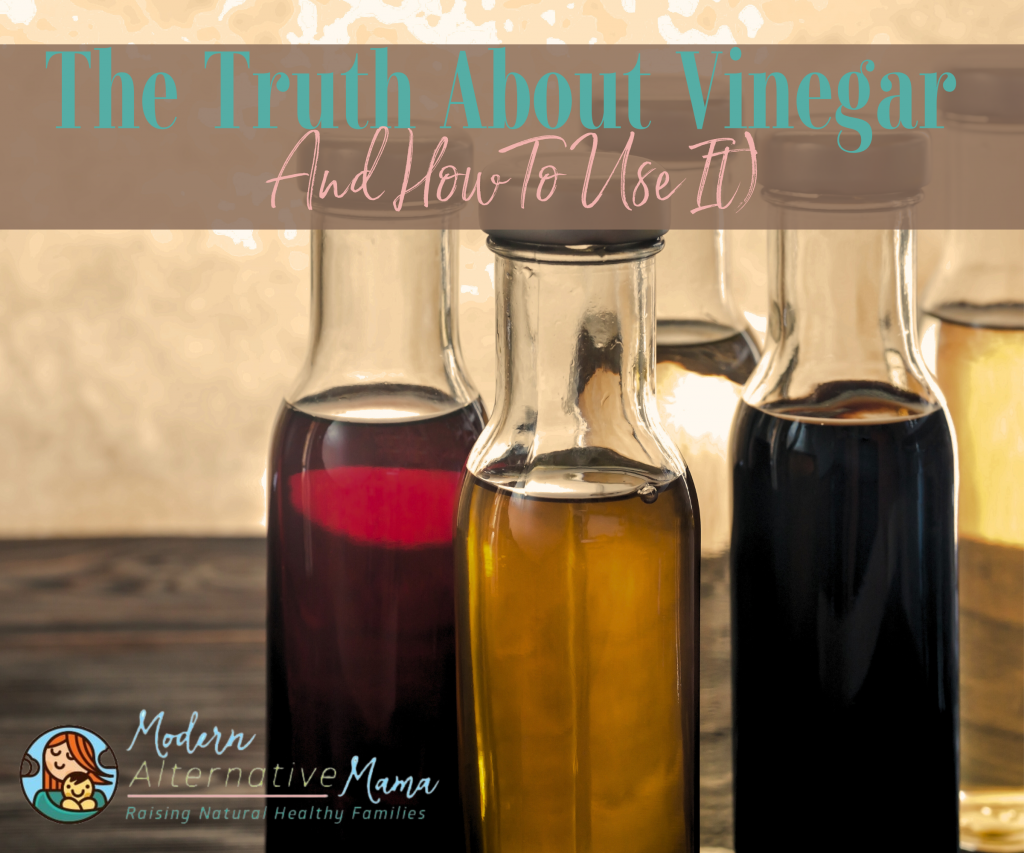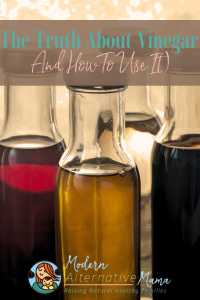By Mariah and Rustina, Contributing Writers
From pickles to cleaners to volcano experiments, vinegar has a potential in most any job!
What is Vinegar?
Vinegar goes all the way back to Babylon times where it was treated more as a wine compared to how it is treated today. A vinegar is made when a grain or fruit (some sort of sugar source) is fermented into an alcohol, and then that is fermented once more into an acetic acid.
There are many types of vinegar. These vary by the initial sugar source (apples, rice, wine, grains, etc). Most of the properties are the same, but some have more benefits than others, and they decidedly have unique flavors!
The types of vinegar:
- Apple cider vinegar
- White vinegar
- Wine vinegar (Champagne, Sherry, etc)
- Malt vinegar
- Balsamic vinegar
- Rice vinegar
Although there are other ones like honey vinegar, coconut vinegar, and even kombucha vinegar!
The 2 Most Popular Vinegars
The two most popular vinegars to use are apple cider vinegar and white vinegar. Most of the others are more common for specific recipes than used for say cleaning or natural healing. Apple cider vinegar is used more in remedies while white distilled vinegar is used more for cleaning and pickling.
Apple Cider Vinegar
When you think about using vinegar, maybe you immediately go to making a salad or using it for your natural cleaning products. There are so many things you can use different types of vinegar for. The BIG popular vinegar of all vinegars is, of course, apple cider vinegar.
Apple cider vinegar (ACV) has some incredible benefits for your health plus it is a source of phosphorus, magnesium, potassium, calcium, and probiotics (1). Apple cider vinegar has 5-6% acetic acid content.
White Vinegar
White vinegar can be made from fermented foods like sugar beets, corn, potatoes, or molasses. Most of what is purchased in stores is made with corn. It is transparent by being distilled. That is when the vinegar is steamed with high heat, then turns to condensation, and thus back into a liquid. It removes all impurities and most nutrients leaving just the acetic acid and water, nice and clear. Most store-bought white distilled vinegars are between 5-10% acetic acid content.
Because it is clear and not as flavorful or aromatic, it makes a great cleaner. You can mix it in a spray bottle (1 part vinegar to 2 parts water) and use it as a multipurpose cleaner for:
- Countertops
- Windows
- Sinks
- Mirrors
- Floors
- Any moldy areas
- Stovetops, dishwashers, and grease/grime areas
Benefits and Uses of Vinegar:
-
- Acetic acid is anti-bacterial. That means it kills bacteria – tiny little organisms that are all around us. Some are good, but some can hurt us.
- Acetic acid is known for killing mycobacteria, the family of bacteria that causes leprosy and tuberculosis as well as many other bacteria. (5)
-
- This means it can kill fungus – tiny spore organisms like mold and yeast.
- Research shows that the acid and enzymes can kill excess yeast.
- Here are some yeast situations that may be helped:
- Foot fungus/athlete’s foot
- If you have fungus anywhere on your feet, put 1 cup of vinegar in a bowl or tub of water to soak for at least 30 minutes.
- Skin yeast infection
- Apply a 1 part vinegar to 2 part water (1 to 3 if a sensitive area) mixture of vinegar to water. This may burn slightly.
- Put 1-2 cups of vinegar in bath water. The dilution will not burn the skin, but may cause irritation if it gets in the eyes.
- Internal Yeast Overgrowth
- 1 tablespoon of vinegar in 1 cup of water can be taken once or twice daily until symptoms of yeast overgrowth are gone. Then consume 2-3 times a week for maintenance.
- Foot fungus/athlete’s foot
-
- Digestion is how our stomach breaks down food. When food is not broken down properly, we can get an upset stomach or other problems, like the stomach acid trying to come up towards our mouths (acid reflux).
- May reduce acid reflux and heartburn
- vinegar creates a similar acidic nature as the stomach to help break down food and relieve indigestion from a lack of stomach acid.
- Promotes gut health
- Beneficial bacteria in vinegar can support the health of your digestive system and gut bacteria with increased immunity and a better ability to break down and absorb nutrients.
-
- Vinegar may help increase production of nitric oxide, a blood vessel relaxing compound.
- Helps to inhibit enzymes that cause blood vessels to constrict.
- When hypertensive rats were given acetic acid, it resulted in reduced blood pressure.
- Antioxidant (14)
-
- May increase the super antioxidant glutathione peroxidase [GPx]
- Supports the Circulation of Blood (15)
-
- Our heart pumps out blood to all the body in the arteries, and then that blood is returned through veins – creating a circulation of blood.
- Sometimes veins can become swollen with too much blood, especially in the lower legs. This is called varicose veins, and they can be very painful. Vinegar has properties that help promote a better circulation to help keep the blood from staying too long in the legs.
-
- Diabetes is a long-lasting health condition that affects how your body turns food you eat into energy you can use. There are 2 main types, Type 1 and Type 2.
- Type 1 is when the body cannot access enough of the blood sugar to use as energy.
- Type 2 is when there is too much sugar in the bloodstream that can cause damage to the circulatory and immune systems (how we stay healthy) as well as other areas.
- Vinegar (esp ACV) can help the body better process the blood sugar so there is not so much in the bloodstream. This is very helpful for those with Type 2 Diabetes.
- To help support blood sugar levels, dilute one to two tablespoons of vinegar in 1 cup of water and drink before meals.
- Diabetes is a long-lasting health condition that affects how your body turns food you eat into energy you can use. There are 2 main types, Type 1 and Type 2.
- Reduces Cholesterol (19)
-
- Cholesterol is a waxy substance that can build up in the arteries, causing them to narrow and harden. If it builds up too much, then it puts a strain on your heart muscles trying to push blood through the “mess.” This forces it to work harder and wear out faster.
- Vinegar can reduce the amount of cholesterol to help promote a healthier heart.
- Add a tablespoon or two of vinegar in a cup of water.
- Support Skin and Scalp Health
-
- May reduce acne and scarring.
- Acne is when the hair follicles become clogged up making a red, swollen bump on the skin.
- The acids in vinegar have been shown to inhibit the growth of some causes of acne. (20)
- Studies show that treating acne scars with lactic acid (another acid in ACV) for three months led to improvements in the texture, color, and appearance of treated skin. (21)
- Toner
- To use as a toner, mix 1 part vinegar to 1 part water. You can add complimentary essential oils if you wish (you will need to shake it with every use). Put in a glass spray bottle.
- Relieve Sunburns and Bug Bites
- Vinegar can help alleviate the pain from burns and bites.
- For sunburns, apply vinegar and water (1 part vinegar to 3 parts Water mix) with a cotton cloth or spray directly to the skin.
- For bug bites and even said to help jellyfish stings, apply a 1 part vinegar to 2 parts Water mix directly on the bite.
- Vinegar can help alleviate the pain from burns and bites.
- Removes Warts
- Soak a cotton ball in vinegar , applying directly to the wart and covering with a bandage overnight.
- Repeat until the wart falls off.
- Hair Rinse
- Lowers pH of the scalp and relieves itchiness.
- Helps eliminate dandruff
- Use a 1 part vinegar to 2 parts water mixture, and massage onto the scalp. Once a week to once a month may be all that is needed.
- May reduce acne and scarring.
- Weed Killer
- Use straight – just pour onto the grass you wish to kill. It will kill most plants. It can also be mixed with water and epsom salt.
- Fruit and Veggie Wash
- Mix 1 part vinegar to 3 parts Water and put in a spray bottle to wash and rinse new fruit and veggies.
- Baking
- Used as a leavening agent in baking (helps make cakes and bread rise) when paired with baking powder. Together the two create a salt called sodium acetate, water, and carbon dioxide (you smell that gas when you make those volcanoes with the kids).
Risks of Vinegar
There are risks if you get it undiluted, especially on the sensitive skin. It can cause potential redness, irritation, or even burning. Make sure to always dilute it as recommended above, wear gloves if sensitive. Wash hands with soap and warm water after using.
If taken internally undiluted, it can damage the enamel of the teeth, may irritate the throat, and damage the lining of the esophagus and stomach. Always dilute vinegars of any type!
Do not mix vinegar with bleach or hydrogen peroxide. These can create acids that are dangerous to lungs. Vinegar and bleach make chlorine gas. Mixing vinegar with hydrogen peroxide is said to help with mold, but does create peracetic acid which is corrosive and an irritant to lungs, skin, and eyes so be very careful if you decide to try that!
Vinegar and ammonia actually cancel out the cleaning benefits of each other.
Vinegar and baking soda are often used together. There is a lot of talk about if they do much together. It isn’t toxic. Mixed together they create a very short lived foaming action that is helpful, but again, very short lived. After the foaming, it begins creating sodium acetate, carbon dioxide, and water. If stored in a container, it will build up and create a small “explosion” in the container due to the carbon dioxide.
Looking for some recipes to try? Check out these blogs:
How to Care for Curly Hair Naturally
How to Make Apple Cider Vinegar
Quick Drying No Smearing Window Cleaner
Ingredients:
- 1 part vinegar
- 1 part alcohol
- 1 part water
Directions:
Step 1: Mix in a spray bottle and clean!



